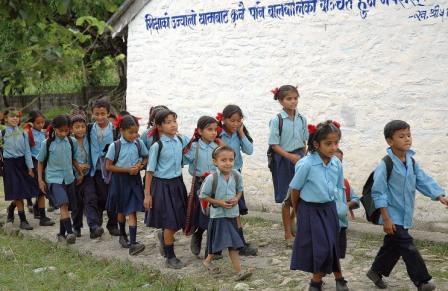
What does it mean to have a sector wide plan for capacity development? And what does it take to make it? These were the key themes of a five day learning event for government and development partners from the education sector in Nepal. Nils Boesen, who facilitated the event, reports that the participants found sensible answers to both questions.
Nepal has, despite unruly times, achieved considerable progress in offering access to education. Quality is, however, far from good enough. How can the education sector and its development partners help the sector to develop capacity to make schools perform, thereby achieving better learning achievements?
This was the challenge discussed during a five day learning process held in Kathmandu from 14-18th September 2009 under the auspices of the Learning Network on Capacity Development (LenCD, see www.lencd.org) and the donor network for competency development, Train4Dev (see www.train4dev.net). (For the full report, click here)
After a half-day session for a broad stakeholder group, a small group worked intensively for three days to shape a conceptual framework for CD in the sector, outline an action plan for making the framework operational and form a core team that can carry the process forward. On the last day, the small group presented the results for endorsement by the wider stakeholder group.
A number of important key messages emerged during the week:

• A CD framework is not something apart, but closely linked to the wider School Sector Reform Plan that the Nepalese government has formulated for 2009-2015. CD is a perspective and approach that must be mainstreamed when this reform is made operational at all levels.
• The school reform plan focus on school performance, as a key means to enable children (and adults in non-formal education) to learn. So the CD framework must have the same focus. CD must be driven by and result in tangible enhancement in school performance - for example in how social audits are carried out and used, how the School Management Committees perform their task, or how local curriculum are developed and used in classrooms.
• Ownership of the CD process is crucial not only at ministry and central level, but at all levels. In the same way that donors cannot "do" capacity development for country stakeholders, then central level authorities cannot impose CD on other levels - there have to be locally grounded processes at all levels of the school system.
• The role of a central level CD framework and core team will be to facilitate and support CD processes, not to control and steer according to a blueprint. As such, it is perhaps better to talk about a "CD framework" rather than a "CD plan". The framework will describe how the system, and the actors, can mainstream CD and make it operational.
• CD should adopt a constant learning perspective, sharing lessons and building on previous successful experiences.
At the end of the learning event, there was a broad consensus and a team ready to take the next steps. Much more needs to be clarified and detailed, but the process empowered the core team which will - with continued backing and commitment from senior leadership and support from development partners - be able to engage in a creative and demanding process of getting capacity development right in the centre of the implementation of the School Sector Reform Plan in Nepal.
Who is responsible for teacher capacity development?

In the CD learning event for the education sector held in Nepal from 14-18, Bhison Saphota who is leading a school in the vicinity of Kathmandu, expressed his strong concern that capacity development should be rooted in and owned by the schools.
"Capacity development has real importance for the school level," said Mr Saphota. "Who is responsible for teacher development? The Ministry of Education? The District Education Officer? Trainers? Head masters? Whose task is it? Learning is voluntary- nobody can force someone else to learn. Therefore, the teachers themselves have to be responsible."
Mr Saphota was particularly adamant that centrally made CD plans would not work.
"Centrally made plans do not work, they need to be locally owned," he said. "Central level can have a facilitating role, including ensuring that teachers have the right incentives to perform. We need to get beyond narrow approaches like teacher training, and create a 'teacher professional support programme', taking all important factors into account".





Log in with your EU Login account to post or comment on the platform.